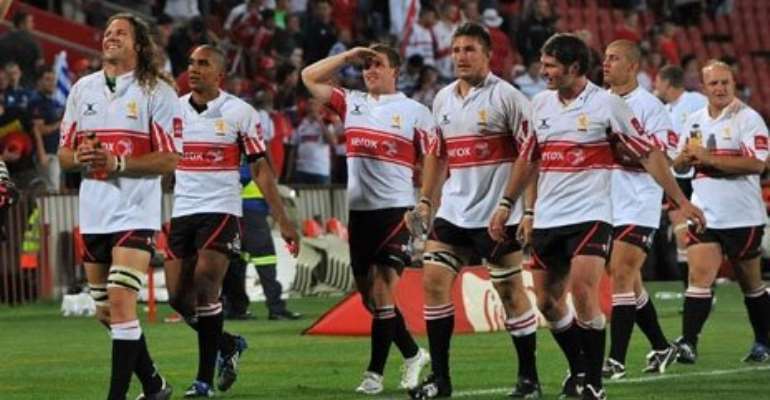BREAKING RACIAL BARRIERS IN SOUTH AFRICAN RUGBY

Robert Gumede told the BBC's Pumza Fihlani he wants to see ”transformation” in the way rugby is perceived in South Africa
http://www.bbc.co.uk/news/world-africa-12039784#story_continues_1
IT billionaire Robert Gumede is determined to change the face of South African rugby – a sport which remains predominantly white, years after the end of minority rule.
Mr Gumede, 47, became the first black businessman to buy a stake in a rugby club when he recently acquired nearly 50% of the Johannesburg-based Golden Lions, along with business partner Ivor Ichikowitz.
“There are many people who say they support change, who say 'change, but not in my back yard'. We are throwing that out of the window. We are going to bring change because change is good. It's change that brought all of us [South Africans] here,” Mr Gumede told the BBC.
The IT mogul, born in rural Nelspruit in Mpumalanga Province says his investment in the Lions was inspired by a cause greater than making money – breaking racial boundaries.
“We cannot have a situation were six million white South Africans support rugby and 43 million blacks are outside at the rugby fold. I believe it is time to break the barriers,” he says.
http://www.bbc.co.uk/news/world-africa-12039784#story_continues_2 We do not support or condone racism. We believe in change and we welcome the investment,” '
End Quote Kevin de Klerk Golden Lions Rugby Union president
Owen Nkumane, a former Springboks national team and Lions player agrees.
“We've won two World Cups but we haven't done what could have been done and what should have been done. We haven't developed rugby in the urban areas, especially in Johannesburg and especially in Soweto.”
Golden Lions Rugby Union President, Kevin de Klerk, says having Mr Gumede on board is proof that the team's management is ready for change.
“We do not support or condone racism. We believe in change and we welcome the investment,” he says.
“This investment catapults the Lions into an entirely new era.
Changing faces
But what does having a black owner mean for the Lions?
If Mr Gumede has his way, the team may stage some games in black townships for the first time in the team's history.
“We want to take the game to where the people are. We want them to experience it in their own backyards,” says Mr Gumede.
He says he wants to see more black players signed to professional rugby clubs, including the Lions.
The inclusion of black players into rugby has been a slow and often controversial process. http://www.sport24.co.za/Rugby/Currie-Cup-too-white-ABSA-20100917
There have been concerns about introducing a quota policy which would compel all national teams to have a certain number of black players.
Critics say players could be selected in the process purely because they are black – compromising the quality of the game.
http://www.bbc.co.uk/news/world-africa-12039784#story_continues_3 Rugby united us all on that day'
End Quote Robert Gumede
The Lions – currently in a rut – were once a powerhouse for South African rugby.
Thirteen players from this club made up the squad which won South Africa's first World Cup in 1995.
This victory became a defining moment for black and white South Africans.
They celebrated and cheered side by side as then President Nelson Mandela stepped onto a podium at Ellis Park stadium wearing the Springboks national team jersey to hold up the trophy with team captain Francois Pienaar.
Mr Gumede was among the few black fans who were at stadium on that day – it was his first rugby game.
“That game was not only for the thousands at the stadium but also the millions of black South Africans across the country. Rugby united us all on that day,” says Mr Gumede.
Slow progress
Mr Gumede says his decision to buy the Lions was inspired by that historic game and more recently by the success of the first matches between the country's top teams to be played in Soweto.
“Those events convinced me of the potential of rugby and reminded me of the ability of the game to bring unity, to build a nation,” he says.
Progress in South African rugby has been slow but evident. The Springboks have a black coach and a growing number of young black players.
But now more than ever, having a multi-racial rugby team is not only important but necessary for the country's rugby future, sports critics say.
Mr Gumede now carries the hopes of loyal Lions supporters, who hope the huge cash injection will boost team morale but also those of young black South Africans who are desperate for a chance to play the game.
